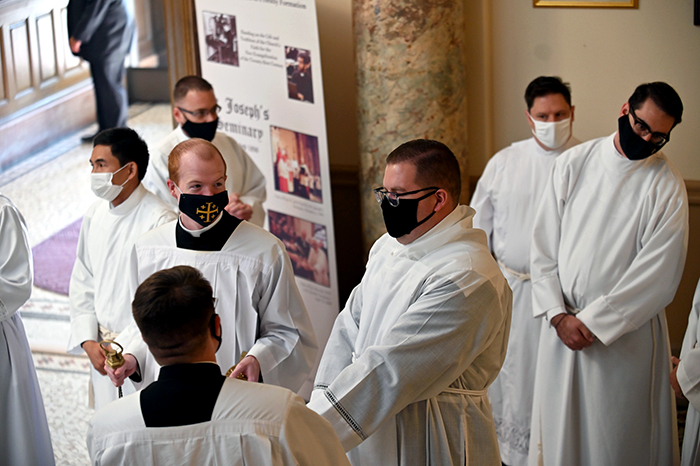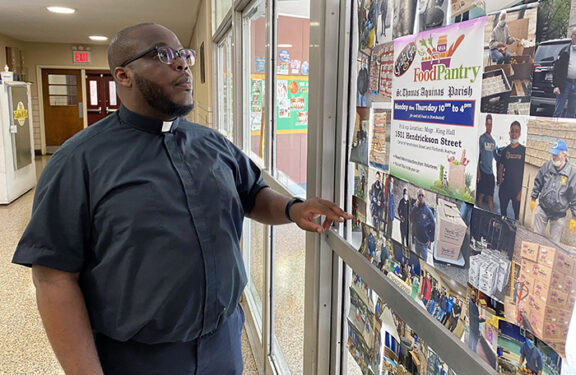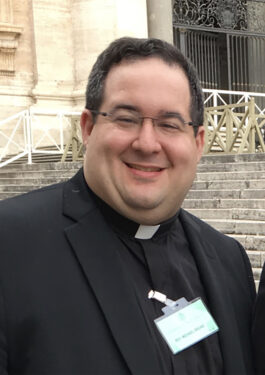
PROSPECT HEIGHTS — Father Dwayne Davis has had to be a quick learner.
In 2018, just five years after he was ordained a priest, he became pastor of St. Thomas Aquinas Parish in Flatlands, Brooklyn, where he’d spent a single year as an administrator.
[Related: Doing God’s Work Can Be Tricky Business]
By contrast, the late Msgr. John Brown — Father Davis’s predecessor and one of his mentors — had spent the better part of two decades as a priest before he became a pastor.

“Back in the day,” Father Davis explained, “you definitely had to have two or three assignments — probably at least 15 years — before becoming pastor.”
But these days, a nationwide shortage of Catholic clergy has resulted in pastoral assignments coming to young priests like Father Davis, who is 35.
“They’re going to be pastors much sooner than seminarians of previous generations,” said Auxiliary Bishop James Massa, rector at St. Joseph’s Seminary and College, Dunwoodie, Yonkers.
Still, seminaries are challenged to squeeze management training in with theological course work, which is the priority, Bishop Massa said.
To that end, workshops are held at St. Joseph’s Seminary to teach topics including stewardship, building maintenance, fundraising, and staff management, to name a few.
“They’re going to need to know this stuff,” Bishop Massa said. “But they’ve got a lot to do by way of academics, so it’s hard to fit everything in. But it’s certainly not ignored.”
Bishop of Brooklyn Robert Brennan said he was glad to hear about the workshops. “It’s hard to prepare men to be priests for any one particular day or age because things change so rapidly,” he said.
“It’s becoming more evident to me that one of the most important aspects of training and preparing a priest would really be [imparting] a sense of resiliency,” he added. “And that means knowing about all aspects of parish life. Even the business aspects have a pastoral dimension to them.”

Organizing the workshops falls to Father Michael Bruno, dean of seminarians.
“I think the challenge is that a lot of the mentoring and preparation has to happen early on,” he said, noting that seminarians should understand that not all parishes are alike.
“Each has a unique profile,” Father Bruno said. “In our diocese, they often are multi-ethnic. Some have a lot of buildings … others might have relationships to an academy or school. So, teaching priest candidates flexibility and adaptability to these different realities is certainly important as well.”
The management workshops are tailored for fourth-year seminarians soon to be ordained. Each semester, two or three workshops are scheduled for Wednesday afternoons.
“Like personal finance and taxes, we actually bring in an accountant, who does parish and priests’ taxes and is an expert in that field,” Father Bruno said.
“For parish administration and human resources we actually bring them to a parish,” he added. “The pastor spends a whole afternoon sharing with them some of his challenges, things that they should look for, questions they should ask.”
Other workshops are held back at the seminary with guest lecturers — like leaders of the fundraising and development offices for the Diocese of Brooklyn or the Archdiocese of New York — who speak to them about how to ask for money or how to make an appeal on behalf of the diocese or the bishop, according to Father Bruno.
The workshops enhance the experiences seminarians have in their second year of theology, during their year-long pastoral internships at parishes.
“Here, the goal of that is to immerse them into the life of the parish, where they literally get to shadow a pastor, and the operation of his parish,” Father Bruno said.
Father Davis, who spent his first three years of formation at the Seminary of the Immaculate Conception in Huntington, New York, and his final year at Dunwoodie, applauded the workshops.
“Back in the days, that wasn’t something that was done,” he said. “So I commend that. As our world begins to change, it is so necessary.”
